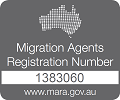At the moment, most offshore prospective marriage visa and offshore partner visa applications take around 12 months or longer to be processed. Most onshore partner visa applications take around 18 months or longer to be processed.
There are many things that visa applicants can do to prevent extra visa processing delays and give their application the best chance of success.
Visa medical exams and police clearance certificates
Visa medical exams and police clearance certificates generally must be less than 12 months old at the time of the visa decision.
Visa applicants can time their visa medical so that the visa medical is done before the visa application is likely to be assessed but will not be more than 12 months old at the time of the visa decision (unless the Department of Home Affairs asks the applicant to do the visa medical exam earlier).
Before partner visa processing times became so long, it was best to submit police clearance certificates at the time of the visa application, because “decision ready” visa applications are often processed faster.
Visa applicants who lodge police certificates at the time of the visa application should also submit new police certificates when the old ones are 12-months old.
For some overseas police certificates that are difficult to get, visa applicants may choose to organise the police certificates so that they are submitted before the visa application is likely to be assessed but will not be more than 12 months old at the time of the visa decision (unless the Department of Home Affairs asks the applicant to submit them earlier).
‘Proof of relationship’ documents
For all prospective marriage visa and partner visa applications, the Department of Home Affairs will assess the couple’s relationship at the time of the visa application and at the time of the visa decision.
With longer visa processing times, it is becoming increasingly important to submit extra proof of relationship documents before the visa application is likely to be assessed. For example, for partner visa applications, proof that the couple is still living together, pooling their financial resources, sharing day-to-day household expenses and planning and undertaking joint social activities.
For couples who are living apart during the processing of an offshore prospective marriage or offshore partner visa application, it is crucial to prove that they are maintaining their relationship during time spent apart. For example, proof of overseas travel to visit each other and proof of regular phone or internet contact during time spent apart.
It is very difficult for couples to prove that their relationship is genuine if they have spent very little time living together in the past few years. Although the partner visa application charge is a large financial commitment for most couples, the extra cost of overseas travel to spend time together while the application is being processed will give the application a much better chance of success.
Updating changes in circumstances
The visa applicant must notify the Department of Home Affairs if their family composition changes (for example if they have a child), if they get a new passport, change their name, change address or contact details or will be away from their usual address for more than 14 days.
Visa applicants and sponsors also must notify the Department of Home Affairs if their relationship breaks down or if any of the information provided in the visa or sponsorship application is not correct and up-to-date (for example if they are charged with or convicted of a criminal offence).
Not notifying changes material to the visa criteria can result in the visa application being refused (or any visa granted being cancelled) and the visa applicant and their family unit members being barred from successfully applying for an Australian visa for 3 years.
The Department of Home Affairs does not publish their partner visa processing priorities. Depending on their current processing priorities, some applications may be processed faster than others. For example, applications for people from “low risk” countries or onshore partner visa applications by prospective marriage visa holders.
Registered migration agents who specialise in partner visas generally have dozens of applications in the partner visa processing pipeline and can give advice about what extra documents to submit and when.


